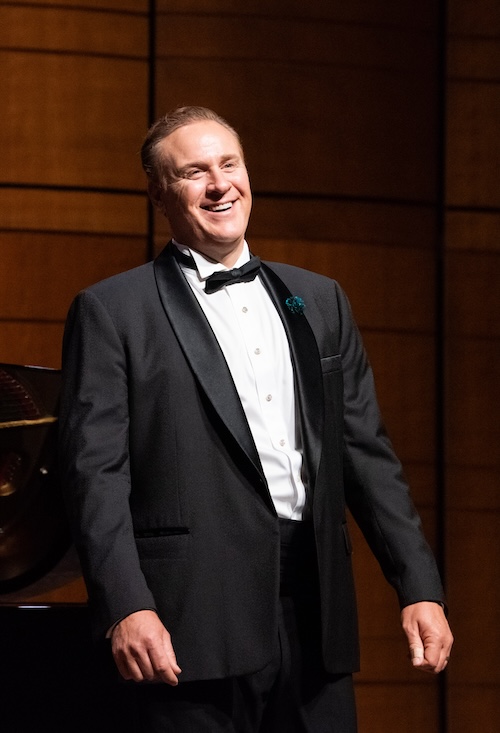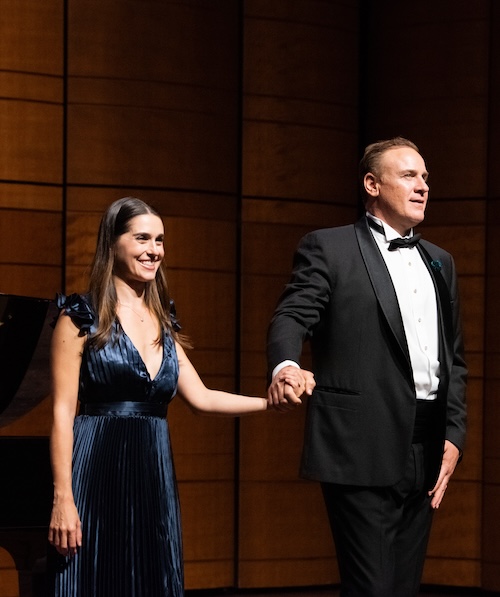Husband-and-wife Meachems open Vocal Arts season with rich wreath of song

Baritone Lucas Meachem performed a recital for Vocal Arts DC Thursday night at the Kennedy Center Terrace Theater. Photo: Courtney Ruckman
Lucas Meachem made a distinguished Vocal Arts DC debut Thursday night. The program combined a first half of impassioned declarations of love with a more somber second half devoted to the theme of grief. Washington seems not quite back in full concert-going swing at this point in mid-September, and the Kennedy Center Terrace Theater was disappointingly under-filled.
The North Carolina-born baritone, who had a splendid turn as Germont in Washington National Opera’s La Traviata in 2018, plied his suavely controlled and powerful voice to songs in a broad range of languages. He opened with Liszt’s Tre Sonetti del Petrarca in a transposed version for lower voice, also somewhat simplified. As a result the performance proved less about high-flying virtuosity than legato intensity.
Meachem displayed consummate control of both his instrument and his outgoing stage presence from the opening of the first song. He reserved the most powerful sound for the climax of the sonnet’s last line, ending on a sweet phrase (“Benedetto”) that soared in a sweetly tuned head voice. Twice in this more subdued version, Liszt gives the voice an unaccompanied recitative section, which Meachem rendered with quiet tenderness.
At the keyboard was pianist Irina Meachem, who is also the singer’s wife. She matched her partner’s careful attention to sensitive phrasing: in many of the evening’s quiet songs, one heard both artists delicately softening the ends of lines, adding organic complexity to each musical statement. She tended to draw out her longer introductions and postludes, sometimes slightly at odds with her partner’s tempo.
Comic relief came in Ravel’s mini-cycle Don Quichotte à Dulcinée, with Meachem’s swaggering presence summoning up the ideal exaggerated gallantry of the deluded knight. The somewhat deliberate pacing of “Chanson romanesque,” while pleasing, tested the fortitude of some of the baritone’s top notes. Religious devotion came out in the planing chords and chant-like intonation of the “Chanson épique,” while Meachem’s understated approach suited the gradually revealed tipsiness of the “Chanson à boire.”
After impeccable Italian and French diction, unabashed romantic heart prevailed in a set of three Russian romances by Rachmaninoff. After a potent crescendo up to a smoldering high note in “In the silence of the mysterious night,” the couple rendered “As fair as the day in blaze of noon” with hypnotic elegance. The torrential volume, from both pianist and singer, in “Spring Waters” brought the first half to a tumultuous close.

Lucas Meachem performed with his wife, pianist Irina Meachem, Thursday night. Photo: Courtney Ruckman
The hope of blossoming love turned to despair with a bleak performance of Mahler’s Kindertotenlieder. Friedrich Rückert wrote this raw, personal poetry after losing two children to scarlet fever, but he never intended it to be published. Although both musicians brought out many of the work’s agonizing details, in these somber songs this performance felt somewhat limited and unvaried in expression.
A change was immediately evident in the two brief songs that followed Kindertotenlieder, presented as elegiac responses to Mahler and Rückert. Great vitality brimmed in William Grant Still’s “Grief,” sometimes known by its opening words, “Weeping angel with pinions trailing.” The poem by LeRoy V. Brant, inspired by a weeping angel statue found in a cemetery, offered a meditative backdrop for Meachem’s plaintive tone, marvelously expressive even though much of the melody consists of repeated notes.
Steve White’s sentimental arrangement of the folk song “Shenandoah” added another layer of meaning in the wake of Mahler, with the second verse beginning with the words “Oh Shenandoah, I love your daughter.” Meachem again excelled in the control of his stellar head voice on an extended high note at the conclusion.
Lifting the mood, Meachem turned to opera for two impressive encores: a rollicking, slapstick “Largo al factotum” from Rossini’s Barber of Seville, followed by a forceful, emotionally draining “Eri tu” from Verdi’s Un Ballo in Maschera. While Meachem made a fine conversion to the more restrained style of the lieder recital, it was clear that his greatest strengths lay with his dramatic sense and stage presence.
South African tenor Lunga Eric Hallam sings Italian art songs, as well as American and African folk songs, with pianist Craig Terry 7:30 p.m. November 18. vocalartsdc.org




